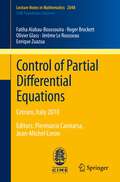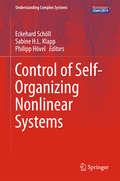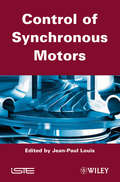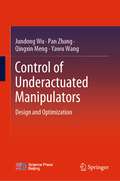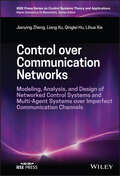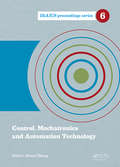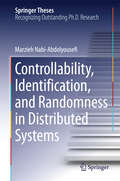- Table View
- List View
Control of Partial Differential Equations: Cetraro, Italy 2010, Editors: Piermarco Cannarsa, Jean-Michel Coron (Lecture Notes in Mathematics #2048)
by Enrique Zuazua Jérôme Le Rousseau Roger Brockett Olivier Glass Jean-Michel Coron Fatiha Alabau-Boussouira Piermarco CannarsaThe term "control theory" refers to the body of results - theoretical, numerical and algorithmic - which have been developed to influence the evolution of the state of a given system in order to meet a prescribed performance criterion. Systems of interest to control theory may be of very different natures. This monograph is concerned with models that can be described by partial differential equations of evolution. It contains five major contributions and is connected to the CIME Course on Control of Partial Differential Equations that took place in Cetraro (CS, Italy), July 19 - 23, 2010. Specifically, it covers the stabilization of evolution equations, control of the Liouville equation, control in fluid mechanics, control and numerics for the wave equation, and Carleman estimates for elliptic and parabolic equations with application to control. We are confident this work will provide an authoritative reference work for all scientists who are interested in this field, representing at the same time a friendly introduction to, and an updated account of, some of the most active trends in current research.
Control of Particulate Matter Contamination in Healthcare Manufacturing
by Thomas A. BarberWritten by an expert in the industry, this text addresses the specifics of contamination, including particle origination, characterization, identification, and elimination, with a special focus on quality. The author offers a clear and concise review of particle populations and their control in stability, efficacy, and predictability in the manufacture of healthcare products. He brings together information from over 100 Web sites and other sources and casts it into a practical framework that will help readers ensure their company's success. The book contains thirty-two color photomicrographs and over eighty figures, tables, and charts.
Control of Polymerization Reactors
by F. Joseph Schurk Pradeep B. Deshpande Kenneth W. Leffew Vikas M. NadkarniThis reference and text provides an in-depth description of developments in control techniques and their application to polymerization reactors and offers important introductory background information on polymerization reaction engineering.;Discussing modelling, identification, linear, nonlinear and multivariable schemes, Control of Polymerization Reactors: presents all available techniques that can be used to control reactors properly for optimal performance; shows how to manipulate pivotal variables that affect reactor control; examines methods for deriving dynamic process models to improve reactor efficiency; reviews reactor control problems and points out end-use properties; supplies methods for measuring process variables, and ways to estimate variables that can't be measured; and explains how single-input, single-output (SISO) strategies can be effectively used for control.;Filled with illustrative examples to clarify concepts, including more than 730 figures, tables and equations, Control of Polymerization Reactors is intended for use as a reference for chemical, process development, process design, research and development, control systems, and polymer engineers; and polymer chemists and physicists; as well as a text for upper-level undergraduate and graduate students in polymerization reactor control courses.
Control of Self-Organizing Nonlinear Systems (Understanding Complex Systems)
by Philipp Hövel Eckehard Schöll Sabine H. L. KlappThe book summarizes the state-of-the-art of research on control of self-organizing nonlinear systems with contributions from leading international experts in the field. The first focus concerns recent methodological developments including control of networks and of noisy and time-delayed systems. As a second focus, the book features emerging concepts of application including control of quantum systems, soft condensed matter, and biological systems. Special topics reflecting the active research in the field are the analysis and control of chimera states in classical networks and in quantum systems, the mathematical treatment of multiscale systems, the control of colloidal and quantum transport, the control of epidemics and of neural network dynamics.
Control of Solar Energy Systems (Advances in Industrial Control)
by Manuel Berenguel Diego Martínez Eduardo F. Camacho Francisco R. RubioControl of Solar Energy Systems details the main solar energy systems, problems involved with their control, and how control systems can help in increasing their efficiency. Thermal energy systems are explored in depth, as are photovoltaic generation and other solar energy applications such as solar furnaces and solar refrigeration systems. This second and updated edition of Advanced Control of Solar Plants includes new material on: solar towers and solar tracking; heliostat calibration, characterization and offset correction; solar radiation, estimation, prediction, and computation; and integrated control of solar plants. This new edition contains worked examples in the text as well as proposed exercises and simulation models and so will be of great use to the student and academic, as well as the industrial practitioner.
Control of Surge in Centrifugal Compressors by Active Magnetic Bearings: Theory and Implementation (Advances in Industrial Control)
by Paul E. Allaire Zongli Lin Se Young YoonSurge Control of Active-magnetic-bearing-suspended Centrifugal Compressors sets out the fundamentals of integrating active magnetic bearing (AMB) rotor suspension technology in compressor systems, and describes how this relatively new bearing technology can be employed in active control of compressor surge initiation. The authors provide a self-contained and comprehensive review of rotordynamics and the fundamentals of AMB technology. The active stabilization of compressor surge employing AMBs in a machine is fully explored, from modeling of instability and controller design, to the implementation and experimental testing of the control algorithm in a specially-constructed, industrial-size centrifugal compression system. The results of these tests demonstrate the great potential of the new surge control method suggested in this text. This book will be useful for engineers in industries that involve turbocompressors and magnetic bearings, as well as for researchers and graduate students in the field of applied control. Whatever their level of experience, engineers working in the fields of turbomachinery, magnetic bearings, rotordynamics and controls will find the material in this book absorbing as all these important aspects of engineering are integrated to create a multi-disciplinary solution to a real-life industrial problem and the book is a suitable introduction to the area for newcomers.
Control of Synchronous Motors (Wiley-iste Ser.)
by Jean-Paul LouisSynchronous motors are indubitably the most effective device to drive industrial production systems and robots with precision and rapidity. Their control law is thus critical for combining at the same time high productivity to reduced energy consummation. As far as possible, the control algorithms must exploit the properties of these actuators. Therefore, this work draws on well adapted models resulting from the Park’s transformation, for both the most traditional machines with sinusoidal field distribution and for machines with non-sinusoidal field distribution which are more and more used in industry. Both, conventional control strategies like vector control (either in the synchronous reference frame or in the rotor frame) and advanced control theories like direct control and predictive control are thoroughly presented. In this context, a significant place is reserved to sensorless control which is an important and critical issue in tomorrow’s motors.
Control of Underactuated Manipulators: Design and Optimization
by Jundong Wu Pan Zhang Qingxin Meng Yawu WangThis book investigates in detail cutting-edge technologies of underactuated manipulator control, which is a frontier topic in robotics that possesses great significance in energy conservation as well as fault tolerance for industrial applications. It is also the crucial technology associated with systems in special environments, including underwater or aerospace environments. So far, the topic of underactuated manipulator control has attracted engineers and scientists from various disciplines, such as applied physics, material, automation and robotics. Pursuing a holistic approach, the book establishes a fundamental framework for this topic, while emphasizing the importance of design and optimization in the control of underactuated manipulators. Chapters of the book cover a wide variety of manipulator systems, including vertical underactuated manipulator, planar underactuated manipulator with first-order nonholonomic constraint, planar underactuated manipulator with second-order nonholonomic constraint and flexible underactuated manipulator. The book is intended for undergraduate and graduate students that are interested in underactuated manipulators, researchers that investigate the design and optimization for controllers of underactuated manipulators and engineers working with underactuated systems.
Control of Wave and Beam PDEs: The Riesz Basis Approach (Communications and Control Engineering)
by Bao-Zhu Guo Jun-Min WangControl of Wave and Beam PDEs is a concise, self-contained introduction to Riesz bases in Hilbert space and their applications to control systems described by partial differential equations (PDEs). The authors discuss classes of systems that satisfy the spectral determined growth condition, the problem of stability, and the relationship between fulfillment of the condition and stability. Using the (fundamental) Riesz-basis property, the book shows how controllability, observability, stability, etc., can be derived for a linear system. The text provides a crash course in the mathematical theory of Riesz bases so that a reader can quickly understand this powerful method of dealing with linear PDEs. It introduces several important methods for achieving the Riesz basis property through spectral analysis, as well as new approaches including treatment of systems coupled through boundary weak connections. The book moves from a discussion of mathematical preliminaries through bases in Hilbert Spaces to applications to Euler–Bernoulli and Rayleigh beam equations and hybrid systems. The final chapter expands the use of the book’s methods to applications in other systems. Many typical examples, representing physical systems, are discussed in the text. The book is suitable not only for applied mathematicians seeking a powerful tool to understand control systems, but also for control engineers interested in the mathematics of PDE systems.
Control of the Gravitational Wave Interferometric Detector Advanced Virgo (Springer Theses)
by Julia Casanueva DiazThis book focuses on the development and implementation of the longitudinal, angular and frequency controls of the Advanced Virgo detector, both from the simulation and experimental point of view, which contributed to Virgo reaching a sensitivity that enabled it to join the LIGO-Virgo O2 run in August 2017. This data taking was very successful, with the first direct detection of a binary black hole merger (GW170814) using the full network of three interferometers, and the first detection and localization of a binary neutron star merger (GW170817). The second generation of gravitational wave detector, Advanced Virgo, is capable of detecting differential displacements of the order of 10–21m. This means that it is highly sensitive to any disturbance, including the seismic movement of the Earth. For this reason an active control is necessary to keep the detector in place with sufficient accuracy.
Control over Communication Networks: Modeling, Analysis, and Design of Networked Control Systems and Multi-Agent Systems over Imperfect Communication Channels (IEEE Press Series on Control Systems Theory and Applications)
by Lihua Xie Liang Xu Qinglei Hu Jianying ZhengControl over Communication Networks Advanced and systematic examination of the design and analysis of networked control systems and multi-agent systems Control Over Communication Networks provides a systematic and nearly self-contained description of the analysis and design of networked control systems (NCSs) and multi-agent systems (MASs) over imperfect communication networks, with a primary focus on fading channels and delayed channels. The text characterizes the effect of communication channels on the stability and performance of NCSs, and further studies the joint impact of communication channels and network topology on the consensus of MASs. By integrating communication and control theory, the four highly-qualified authors present fundamental results concerning the stabilization of NCSs over power-constrained fading channels and Gaussian finite-state Markov channels, linear-quadratic optimal control of NCSs with random input gains, optimal state estimation with intermittent observations, consensus of MASs with communication delay and packet dropouts, and synchronization of delayed Vicsek models. Simulation results are given in each chapter to demonstrate the developed analysis and synthesis approaches. The references are comprehensive and up-to-date, enabling further study for readers. Topics covered in Control Over Communication Networks include: Basic foundational knowledge, including control theory, communication theory, and graph theory, to enable readers to understand more complex topics The stabilization, optimal control, and remote state estimation problems of linear systems over channels with fading, signal-to-noise constraints, or intermittent measurements Consensus problems of MASs over fading/delayed channels, with directed and undirected communication graphs Control Over Communication Networks provides a valuable unified platform for understanding the analysis and design of NCSs and MASs for researchers, control engineers working on control systems over communication networks, and mechanical engineers working on unmanned systems. Preliminary knowledge of linear system theory and matrix analysis is required.
Control, Computer Engineering and Neuroscience: Proceedings of IC Brain Computer Interface 2021 (Advances in Intelligent Systems and Computing #1362)
by Szczepan PaszkielThis book presents the proceedings of the 4th International Scientific Conference IC BCI 2021 Opole, Poland. The event was held at Opole University of Technology in Poland on 21 September 2021. Since 2014, the conference has taken place every two years at the University’s Faculty of Electrical Engineering, Automatic Control and Informatics. The conference focused on the issues relating to new trends in modern brain–computer interfaces (BCI) and control engineering, including neurobiology–neurosurgery, cognitive science–bioethics, biophysics–biochemistry, modeling–neuroinformatics, BCI technology, biomedical engineering, control and robotics, computer engineering and neurorehabilitation–biofeedback.
Control, Mechatronics and Automation Technology: Proceedings of the International Conference on Control, Mechatronics and Automation Technology (ICCMAT 2014), July 24-25, 2014, Beijing, China (IRAICS Proceedings)
by Dawei ZhengThis proceedings volume contains selected papers presented at the 2014 International Conference on Control, Mechatronics and Automation Technology (ICCMAT 2014), held July 24-25, 2014 in Beijing, China. The objective of ICCMAT 2014 is to provide a platform for researchers, engineers, academicians as well as industrial professionals from all over th
Control: The Dark History And Troubling Present Of Eugenics
by Adam RutherfordHow did an obscure academic idea pave the way to the Holocaust within just fifty years? Control is a book about eugenics, what geneticist Adam Rutherford calls “a defining idea of the twentieth century.” Inspired by Darwin’s ideas about evolution, eugenics arose in Victorian England as a theory for improving the British population, and quickly spread to America, where it was embraced by presidents, funded by Gilded Age monopolists, and enshrined into racist American laws that became the ideological cornerstone of the Third Reich. Despite this horrific legacy, eugenics looms large today as the advances in genetics in the last thirty years—from the sequencing of the human genome to modern gene editing techniques—have brought the idea of population purification back into the mainstream. Eugenics has “a short history, but a long past,” Rutherford writes. The first half of Control is the history of an idea, from its roots in key philosophical texts of the classical world all the way into their genocidal enactment in the twentieth century. The second part of the book explores how eugenics operates today, as part of our language and culture, as part of current political and racial discussions, and as an eternal temptation to powerful people who wish to improve society through reproductive control. With disarming wit and scientific precision, Rutherford explains why eugenics still figures prominently in the twenty-first century, despite its genocidal past. And he confronts insidious recurring questions—did eugenics work in Nazi Germany? And could it work today?—revealing the intellectual bankruptcy of the idea, and the scientific impossibility of its realization.
Control: The Dark History and Troubling Present of Eugenics
by Adam Rutherford* FROM THE SUNDAY TIMES BESTSELLING AUTHOR OF HOW TO ARGUE WITH A RACIST *Throughout history, people have sought to improve society by reducing suffering, eliminating disease or enhancing desirable qualities in their children. But this wish goes hand in hand with the desire to impose control over who can marry, who can procreate and who is permitted to live. In the Victorian era, in the shadow of Darwin's ideas about evolution, a new full-blooded attempt to impose control over our unruly biology began to grow in the clubs, salons and offices of the powerful. It was enshrined in a political movement that bastardised science, and for sixty years enjoyed bipartisan and huge popular support. Eugenics was vigorously embraced in dozens of countries. It was also a cornerstone of Nazi ideology, and forged a path that led directly to the gates of Auschwitz. But the underlying ideas are not merely historical. The legacy of eugenics persists in our language and literature, from the words 'moron' and 'imbecile' to the themes of some of our greatest works of culture. Today, with new gene editing techniques, very real conversations are happening - including in the heart of British government - about tinkering with the DNA of our unborn children, to make them smarter, fitter, stronger. CONTROL tells the story of attempts by the powerful throughout history to dictate reproduction and regulate the interface of breeding and society. It is an urgently needed examination that unpicks one of the defining and most destructive ideas of the twentieth century. To know this history is to inoculate ourselves against its being repeated.
Control: The Dark History and Troubling Present of Eugenics
by Adam RutherfordThroughout history, people have sought to improve society by reducing suffering, eliminating disease or enhancing desirable qualities in their children. But this wish goes hand in hand with the desire to impose control over who can marry, who can procreate and who is permitted to live. In the Victorian era, in the shadow of Darwin's ideas about evolution, a new full-blooded attempt to impose control over our unruly biology began to grow in the clubs, salons and offices of the powerful. It was enshrined in a political movement that bastardised science, and for sixty years enjoyed bipartisan and huge popular support. Eugenics was vigorously embraced in dozens of countries. It was also a cornerstone of Nazi ideology, and forged a path that led directly to the gates of Auschwitz. But the underlying ideas are not merely historical. The legacy of eugenics persists in our language and literature, from the words 'moron' and 'imbecile' to the themes of some of our greatest works of culture. Today, with new gene editing techniques, very real conversations are happening - including in the heart of British government - about tinkering with the DNA of our unborn children, to make them smarter, fitter, stronger. CONTROL tells the story of attempts by the powerful throughout history to dictate reproduction and regulate the interface of breeding and society. It is an urgently needed examination that unpicks one of the defining and most destructive ideas of the twentieth century. To know this history is to inoculate ourselves against its being repeated.
Controllability and Minimum Energy Control (Studies in Systems, Decision and Control #162)
by Jerzy KlamkaThe book offers a comprehensive overview of controllability problems and minimum energy control for broad classes of dynamical systems, including linear, semilinear and nonlinear systems, which are important for modeling systems in automatic control, electrical engineering, mechanics and informatics. It develops the theory of controllability for both finite and infinite dimensional dynamical systems described by differential state equation, and studies in detail functional analysis and matrix algebra, which provide essential and effective tools for the new solutions of a number of important controllability problems. The theoretical results are illustrated by examples throughout the book. Primarily intended for academic researchers working in mathematical control theory, the self-contained text is easily accessible and particularly interesting for control engineering and applied mathematics graduates.
Controllability and Stabilization of Parabolic Equations (Progress in Nonlinear Differential Equations and Their Applications #90)
by Viorel BarbuThis monograph presents controllability and stabilization methods in control theory that solve parabolic boundary value problems. Starting from foundational questions on Carleman inequalities for linear parabolic equations, the author addresses the controllability of parabolic equations on a variety of domains and the spectral decomposition technique for representing them. This method is, in fact, designed for use in a wider class of parabolic systems that include the heat and diffusion equations. Later chapters develop another process that employs stabilizing feedback controllers with a finite number of unstable modes, with special attention given to its use in the boundary stabilization of Navier–Stokes equations for the motion of viscous fluid. In turn, these applied methods are used to explore related topics like the exact controllability of stochastic parabolic equations with linear multiplicative noise. Intended for graduate students and researchers working on control problems involving nonlinear differential equations, Controllability and Stabilization of Parabolic Equations is the distillation of years of lectures and research. With a minimum of preliminaries, the book leaps into its applications for control theory with both concrete examples and accessible solutions to problems in stabilization and controllability that are still areas of current research.
Controllability of Singularly Perturbed Linear Time Delay Systems (Systems & Control: Foundations & Applications)
by Valery Y. GlizerThis monograph provides a comprehensive analysis of the control of singularly perturbed time delay systems. Expanding on the author’s previous work on controllability of linear systems with delays in the state and control variables, this volume’s comprehensive coverage makes it a valuable addition to the field. Each chapter is self-contained, allowing readers to study them independently or in succession.After a brief introduction, the book systematically examines properties of different classes of singularly perturbed time delay systems, including linear time-dependent systems with multiple point-wise and distributed state delays. The author then considers more general singularly perturbed systems with state and control delays. Euclidean space controllability for all of these systems is also discussed, using numerous examples from real-life models throughout the text to illustrate the results presented. More technically complicated proofs are presented in separate subsections. The final chapter includes a section dedicated to non-linear time delay systems.This book is ideal for researchers, engineers, and graduate students in systems science and control theory. Other applied mathematicians and researchers working in biology and medicine will also find this volume to be a valuable resource.
Controllability, Identification, and Randomness in Distributed Systems (Springer Theses)
by Marzieh Nabi-AbdolyousefiThis interdisciplinary thesis involves the design and analysis of coordination algorithms on networks, identification of dynamic networks and estimation on networks with random geometries with implications for networks that support the operation of dynamic systems, e. g. , formations of robotic vehicles, distributed estimation via sensor networks. The results have ramifications for fault detection and isolation of large-scale networked systems and optimization models and algorithms for next generation aircraft power systems. The author finds novel applications of the methodology in energy systems, such as residential and industrial smart energy management systems.
Controllable Nonlinear Waves in Graded-Index Waveguides (SpringerBriefs in Applied Sciences and Technology)
by Thokala Soloman RajuThis book highlights the dynamical behavior of self-similar waves in graded-index waveguides in (1+1)-dimensions and (2+1)-dimensions. The mechanism to control these optical similaritons by tailoring the tapering profile is presented. Various nonlinear waves like rogons, butterfly-shaped, and dromion-like waves and their controllable behavior are discussed in detail. The phenomenon of unbreakable Parity-Time symmetry of some of these waves has been delineated for different variety of solvable potentials. Compression of these exotic waves has been demonstrated for dispersion decreasing fiber and periodic management of dispersion and nonlinearity parameters. Competing cubic-quintic nonlinearity scenario and its potential implication on the dynamics of these similaritons has been described in detail. Symbiotic self-similar rogue waves have been discussed in (2+1)-dimensional garded-index waveguide. The book also includes numerical simulations that complement these analytical insights.
Controllable Preparation of Two-Dimensional Metal Sulfide/Oxide for CO2 Photoreduction (Springer Theses)
by Xingchen JiaoThis book introduces readers to the preparation of two-dimensional metal sulfide/oxide for CO2 photoreduction. Based on two-dimensional metal sulfide/oxide materials, this book establishes the structure-to-property relationships of photocatalyst for CO2 photoreduction, and reveals the intrinsic mechanism of the CO2 photoreduction by virtue of the in situ characterization techniques and the density functional theory calculations. It is anticipated that this book will help to identify empirical guidelines for designing and fabricating high-performance catalysts of solar-driven CO2 reduction.
Controllable Synthesis and Atomic Scale Regulation of Noble Metal Catalysts (Springer Theses)
by Yancai YaoThis book introduces readers to the preparation of metal nanocrystals and its applications. In this book, an important point highlighted is how to design noble metal nanocrystals at the atomic scale for energy conversion and storage. It also focuses on the controllable synthesis of water splitting electrode materials including anodic oxygen evolution reaction (OER) and cathode hydrogen evolution reaction (HER) at the atomic level by defect engineering and synergistic effect. In addition, in-situ technologies and theoretical calculations are utilized to reveal the catalytic mechanisms of catalysts under realistic operating condition. The findings presented not only enrich research in the nano-field, but also support the promotion of national and international cooperation.
Controlled Atmosphere Storage of Fruit and Vegetables
by A Thompson Robert K. Prange Dr Roger Bancroft Tongchai PuttongsiriThe third edition of this successful title presents current research and commercial uses of controlled atmosphere storage and modified atmosphere packaging of fresh fruit and vegetables to provide a comprehensive and up-to-date overview. New and developed technologies for the transportation and storage of horticultural products are essential to ensure that produce reaches consumers in the best possible condition, and have the potential to reduce the postharvest use of chemicals, reduce losses and maintain nutritional quality and organoleptic characteristics. Covering the increasingly used science and technology of preserving the freshness of fruit and vegetables in all aspects of their postharvest life, this book puts the subject in the context of its history and current practices, in addition to future prospects. The new edition: - Explores the large volume of research that is continuously being published on the topic. - Reviews and evaluates the adaptation and improvement of commercial technologies. - Considers the effects of techniques and technologies on flavour, quality and physiology, in addition to the damage inflicted by pests, diseases and disorders. - Contains 5 new chapters covering genetics and CA storage, dynamic CA storage, hyperbaric storage, hypobaric storage and fruit ripening. Fully revised and presented in full colour throughout, this book is a readily accessible resource for researchers, scientists, growers, students and industry personnel.
